The Church and the Surprising Offense of God's Love (Foreword by Mark Dever) by Jonathan Leeman

Author:Jonathan Leeman
Language: eng
Format: epub
Tags: ebook
Publisher: Crossway
Published: 2009-12-14T16:00:00+00:00
FIVE ASPECTS OF A CHURCH’S AUTHORITY
So what does Christ authorize the church to do in Matthew 16, 18, and 28? Christ authorizes the church to act in at least five respects as pertains to membership and discipline, which can be illustrated from the New Testament more broadly.
First, Jesus authorized the apostolic church to be the proclaimer and guardian of the good news of Jesus Christ. Remember, the entire conversation began with Jesus asking the disciples who he was. Peter’s confession, along with Peter the apostle, is the rock on which the church is built, and he was given the keys of the kingdom to bind and loose (among other things) applications of the truth. We see this aspect of the keys in motion, for instance, when Paul rebukes the Galatian churches for listening to a false gospel. He chastises them for not protecting this gospel as they should have done (Gal. 1:6–9), and he concedes that even his own authority as an apostle depends upon his keeping to this message (1:8; also 2:11ff.).
Second, Jesus authorized his church to affirm any individual who credibly professes the gospel, just as Jesus affirmed Peter for his profession of faith. First comes a confession of faith, then comes an affirmation of both the confession and the individual who makes it. This, too, seems to be one aspect of exercising the keys of the kingdom for binding and loosing, because an affirmation is done formally through baptism. The early church therefore baptized “those who received his word” (Acts 2:41), those who had “received the Holy Spirit” (Acts 10:47), and those who “believed” (Acts 8:13; 18:8). It baptized people into the “name of Jesus” (Acts 2:38; 8:16; 10:48; 19:5; 22:16; Rom. 6:3), no doubt because they professed Jesus as Lord (Rom. 10:9). By contrast, Jesus did not authorize the church to affirm a profession of faith in Paul, Apollos, or Cephas (1 Cor. 1:13–16). He did not authorize it to affirm the faith of “anonymous Christians” or those who never confess Christ with their mouths (cf. Rom. 10:9). He authorized it to make a public declaration of the fact that so-and-so belongs to him when his or her profession is credible.
It’s probably worth pointing out that I’m making a distinction here between to affirm and to acknowledge. Yes, anyone, even a non-Christian, can acknowledge that so-and-so “is a Christian.” What I mean is that the church has the power of formal, public affirmation, in the way a White House press secretary formally affirms the president’s words. I might personally acknowledge what the president of the United States said, but I would not presume to stand in front of the Washington press corps and formally affirm what he said. The president has not given me such authority. Within the church, that formal recognition occurs through the act of baptism and the distribution of the Lord’s Supper. At no place in the New Testament do we find individuals baptizing themselves or feeding themselves the Lord’s Supper. Nor do
Download
This site does not store any files on its server. We only index and link to content provided by other sites. Please contact the content providers to delete copyright contents if any and email us, we'll remove relevant links or contents immediately.
What Is the Gospel? (Foreword by D. A. Carson) by Greg Gilbert(990)
Jesus in Me by Anne Graham Lotz(970)
Daily Strength: Devotions for Bible Believing Study by Douglas Stauffer & Andrew Ray & Rick Quatro(899)
Christian Ethics by Wilkens Steve;(860)
The Practice Is the Path by Tias Little(823)
New Morning Mercies by Tripp Paul David(809)
Cleaning Up Your Mental Mess by Dr. Caroline Leaf(741)
Veritas: A Harvard Professor, a Con Man and the Gospel of Jesus's Wife by Ariel Sabar(735)
Greatest Mystery in the World by Og Mandino(667)
The Creative Call by Janice Elsheimer(603)
No More Christian Nice Guy by Paul Coughlin(590)
Our Appointment with Life by Thich Nhat Hanh(575)
Monastic Archaeology by Unknown(568)
2084 by John C. Lennox(559)
This One Wild and Precious Life by Sarah Wilson(545)
Jesus--Awesome Power, Awesome Love (Discover 4 Yourself® Inductive Bible Studies for Kids) by Kay Arthur(535)
The Catholic Verses: 95 Bible Passages That Confound Protestants by Dave Armstrong(528)
The Duties of Parents by J.C. Ryle(519)
The Tale of the Tardy Oxcart (Swindoll Leadership Library) by Swindoll Charles R(507)
